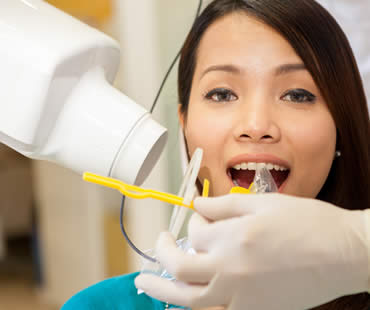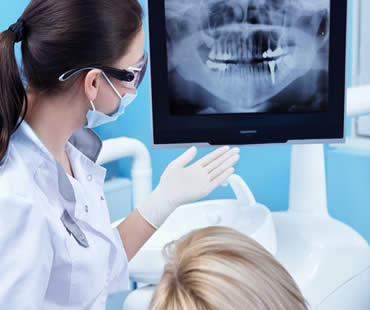
by Dr. Adkins | Nov 25, 2022 | Blog, Dental Topics 2, General Dentistry
Your good health depends on taking excellent care of your teeth. Not only does proper dental care protect your oral health, but it also has a major impact on your overall health. Routine brushing and flossing are just the start. Establishing a relationship with a good general dentist is a vital part of taking care of both your dental health and your general health.
The focus of general dentistry is to stop minor dental problems before they become large health issues. While many dentists now offer cosmetic and restorative treatments, the main responsibility of a general dentist is preventative. Treating cavities, performing root canal treatment, and performing regular cleanings and examinations are some of the important things services by a general dentist.
Even if you take vigilant care of your teeth, only a qualified dentist or hygienist can remove the plaque and tartar that forms around and below your gum line. Regular checkups allow your general dentist to detect problems that could potentially lead to more serious issues. Caught in the early stages, potential trouble like gingivitis or periodontitis can be successfully treated before they become bigger concerns. General dentistry procedures like scaling, root planning, and root canal treatment can be used to save infected teeth.
Prevention is the key to a healthy smile. Taking proper care of your teeth at home and keeping a regular schedule of cleaning and exam appointments with your general dentist will go a long way towards saving your smile for years to come.
Our dental office is located in McDonough

by Dr. Adkins | Oct 7, 2022 | Blog, Dental Topics 2, General Dentistry
What is a dental crown?
- A dental crown encases a damaged tooth completely within a custom-fit cap, or crown, fitting perfectly over the affected tooth. A dental crown is designed specifically for you and your tooth’s particular design, fit and function. It is a restorative therapy that can restore function to a tooth that may have had excessive decay, has been cracked or has recently undergone root canal treatment.
How do dental crowns work?
- A dental crown covers a damaged tooth entirely and can be used to improve not only the tooth’s appearance, but also its shape or alignment.
What is a dental bridge?
- A dental bridge makes a literal bridge between two anchor teeth, filling a gap left by a missing tooth that has either fallen out naturally or is the result of acute decay or facial trauma. Dental crowns cover the bordering anchor teeth, allowing the bridge to fit securely and to function as your natural tooth.
What materials are used for dental crowns?
- Dental crowns can be porcelain (ceramic), porcelain-fused-to-metal, or gold or other metal alloy. Porcelain or ceramic crowns can be designed to closely match the color and translucency of your natural teeth. Metal alloys are usually stronger, and are a better choice for back teeth.
Is a dental cap a crown?
- Yes! A dental cap is another name for a dental crown.
Am I a candidate for a dental bridge?
- If you are missing a tooth and you have adjacent teeth that are stable, dental bridges are for you. Even if you are missing a front tooth or a tooth that has only one border, there are types of dental bridges that could meet your needs.
Are there alternatives to a dental bridge?
- Dental implants are rising in popularity as technology has improved. A dental implant can restore a single tooth or can restore several, and are the standard of care for the replacement of a missing tooth today. Because a dental implant continues to stimulate the jawbone, it doesn’t lead to bone loss over time.
If you need a dentist in McDonough contact us today

by Dr. Adkins | May 6, 2022 | Blog, Dental Topics 2, General Dentistry
Dental crowns and bridges were originally made to fix terribly damaged or missing teeth. No matter how your teeth have been damaged, crown and bridge restorations can help to restore your beautiful smile.
Even one missing tooth can cause surrounding teeth to shift and create a crooked smile. Missing and broken teeth can also cause problems speaking and chewing. One of the best options for restoring function and improving the aesthetics of your smile are dental crowns and bridges.
Crowns are placed over a tooth to help restore form and function when a traditional filling is not sufficient to do the job. A bridge works to replace missing teeth. There are several options for the type of bridge that is placed, depending on your specific situation. Crowns and bridges can be made of natural looking tooth-colored material, metal, or some of both.
Crowns improve the look of your smile, improve the function of your teeth, and help restore your overall oral health. A crown can be used to repair and protect a tooth with old, broken-down fillings as well as to replace older, metal crowns. Crowns are also used to protect the existing tooth structure following root canal treatment.
Bridges are used to fill the space of missing teeth, to keep the remaining teeth from shifting and causing changes in the jaw and facial structure. Bridges are also used as an alternative to removable dentures. Bridges can be supported by either natural teeth or dental implants, and improve both the look and function of your smile.
If you are suffering from missing or damaged teeth, consult with your dental professional to find out more about how crowns and bridges can improve both the beauty and function of your smile.
Our dental office is located in McDonough

by Dr. Adkins | Apr 15, 2022 | Blog, Dental Topics 1, General Dentistry
Most dentists recommend that patients replace their toothbrushes every three to four months. About this time, the bristles start to wear out or become frayed, which makes the tool less effective. You should also replace your toothbrush right away if you have been sick so that you don’t re-infect yourself.
Once you are done with the toothbrush, you don’t have to immediately toss it in the trash. These creative opportunities will allow you to put that old toothbrush to good use.
Dust the keyboard
The precision of the bristles makes it a cinch to get between the keys.
Eliminate stains
If you get spots on your carpet or upholstery, an old toothbrush will enable you to really scrub the soiled area and remove the stain.
Touch up your roots
For those who dye their own hair, an old toothbrush is the perfect tool for applying color to specific areas.
Dislodge dirt from under your nails
Gardening will help your plants grow, but will also make your manicure look less than appealing. With an old toothbrush, you can say good-bye to grimy nails.
Polish jewelry
To make your favorite pieces sparkle, use an old toothbrush and a tab of toothpaste to restore their beauty.
Clean bike chains
If you don’t want to look like a mechanic after taking grease off the chains, you can grab an old toothbrush and easily finish the job.
Remove silk strings off ears of corn
Before boiling corn, wipe the ears with an old toothbrush to eliminate the corn silk and keep it out of your teeth.
We look forward to seeing you in our McDonough dental office

by Dr. Adkins | Jul 9, 2021 | Blog, Dental Topics 1, General Dentistry
Your body is a little bit like a puzzle. It gives you clues to help you figure out what’s going on within your body. Did you know your mouth can give you hints about things that may be happening elsewhere in your body? Here’s a list of some of the signs your mouth can give you to pay attention to certain other aspects of your health.
Worn teeth and headache
If your teeth are showing extensive wear, you may be grinding your teeth. This would be even a stronger possibility if you’re also experiencing regular headaches, which can be caused by the muscle tension related to teeth grinding. This condition also indicates that you are likely under too much stress, and that you are unconsciously coping with it by grinding your teeth.
Gums covering teeth
If your gums begin to grow over your teeth and you are on medication, it may mean that your medication is at fault. Some medicines can cause your gums to overgrow, and the dosage needs to be adjusted.
Mouth sores
An open sore in your mouth that doesn’t go away in a couple of weeks can be an indicator of oral cancer. Numbness and unexplained bleeding in your mouth are other signs. Smokers and people over age 60 are at the most risk, but that doesn’t mean it doesn’t affect others too. See your dentist to make sure all is okay.
Cracked teeth
If your teeth begin to crack or wear extensively, you may have gastroesophogeal reflux disease (GERD). It’s a digestive disease that allows stomach acid to flow back into your food pipe and mouth. This acid can cause your teeth to deteriorate. Additional signs of GERD are acid reflux, heartburn, and dry mouth.
Unclean dentures
If you wear dentures, make sure you remove and clean them regularly. Inhaling food debris from your dentures that makes its way to your lungs can lead to pneum

by Dr. Adkins | Jun 18, 2021 | Blog, Dental Topics 2, General Dentistry
The fact is that the health care provider most people should see the most is their general dentist. Because this branch of healthcare is uniquely targeted at preventing disease and promoting good hygiene, general dentistry can help you avoid oral concerns and maintain a healthy and attractive smile.
General dentists are the most common providers for dental treatment for patients of all ages. Routine dental visits involve examinations, sometimes diagnostic tests, professional cleanings, and discussions about concerns. If your checkup reveals issues that require further treatment, most general dentists perform required procedures. However, your general dentist may refer you to a specialist for complex treatments.
What does a general dentist do? Differing from specialists who focus on a certain area of oral care, general dentists offer a wide variety of services.
- Preventive services – The goal of preventive dentistry is to stop disease before it has a chance to progress. Regular exams, diagnostic images, and professional cleanings are part of prevention. Proper oral hygiene techniques will also be discussed.
- Restorative services – Procedures for dental problems falls into this category, including fillings, crowns, gum disease remedies, dentures and more. Some general dentists also offer specialized treatments like root canal therapy and dental implants.
- Overall oral health services – Some dental problems are reflected in overall health concerns. Diabetes, cardiovascular disease, pregnancy complications and other problems may arise. General dentists can identify issues like these and offer treatment or direct you to the right specialist.
- Cosmetic services – Many general dentists offer cosmetic treatments such as dental veneers, teeth whitening, bonding, orthodontics and more.
When should you visit your general dentist? Experts recommend getting checkups every six months, or more often if you have an issue that should be addressed like a toothache or gum bleeding. Cosmetic appointments can be made at any time. The main thing is seeing your general dentist regularly so you can benefit from preventive care.
If you need a dentist in McDonough contact us today








 770-957-5214
770-957-5214  E-Mail Us
E-Mail Us 
